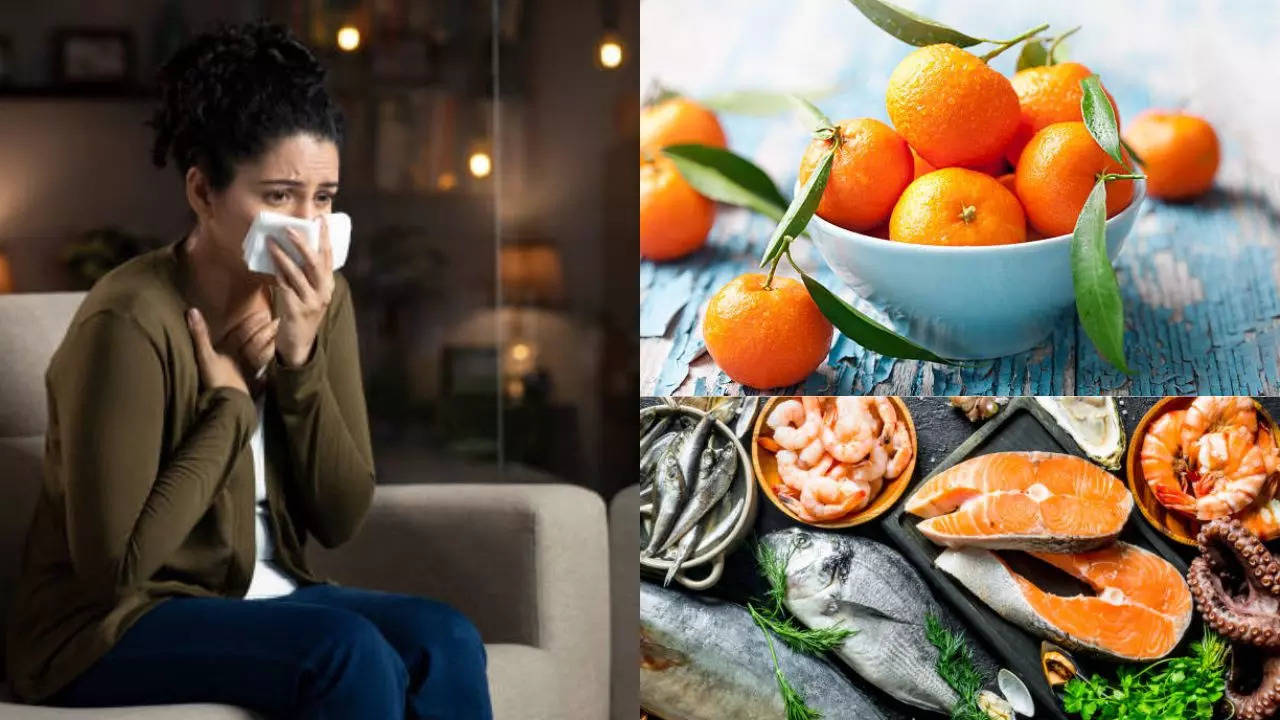Contents
-
news
-
Health
-
Diet
What should you eat and what should you not eat when you have flu?
When you have flu, it becomes difficult to eat or drink anything due to symptoms like cold, cough, fever and body ache. However, doctors recommend eating nutrient-rich foods that help speed recovery and strengthen the immune system, which prevents you from falling sick again. And hence, for good health include foods that are rich in Vitamin A, Vitamin C, Zinc, Selenium and Vitamin D. Read on to know more.

Since most people have little or no appetite when they have the flu, you should choose foods with immune benefits wisely.
Influenza, also known as the flu, is a respiratory infection that causes symptoms like runny nose, sore throat, cough and even fever and body aches. Even though most people recover within a week or ten days, repeated infections can weaken your immunity – worsening the condition and causing complications.
However, according to doctors, no matter how strong your immune system is, following a balanced diet helps support your immunity when you have the flu. Providing your immune system with the nutrients it needs can improve your recovery from the flu.
Since most people have little or no appetite when they have the flu, you should choose foods with immune benefits wisely. Some of these include:
Foods Rich in Vitamin A
Vitamin A helps in the development and growth of immune cells, which are killed by germs such as the viruses that cause flu. And so, it’s important to eat foods that are high in this nutrient – with a daily recommendation of 900 micrograms for adults.
According to experts, foods rich in Vitamin A include milk, chilli, mango and melon. Other important foods that are good sources of vitamin A include:
- sweet potatoes
- spinach
- Carrot
- herring fish
Foods Rich in Vitamin C
Vitamin C is an antioxidant that helps eliminate harmful molecules known as reactive oxygen species, or ROS, from your body. Some immune cells, such as phagocytes, produce ROS to kill germs and if there is an imbalance – too much ROS – it can seriously harm your health.
Vitamin C helps protect your immune cells and keep them healthy. According to doctors, you must take at least 75 mg of Vitamin C daily. Foods rich in this nutrient include:
- red chilli
- orange
- Kiwi
- strawberry
- Broccoli
Vitamin D Rich Foods
Doctors say that Vitamin D is one of the best nutrients that helps strengthen your immune system to fight viruses. It is also helpful in quick recovery from flu. While exposure to sunlight can help increase your vitamin D levels, you should also get an additional 15 micrograms of the nutrient through your diet daily. Foods rich in vitamin D include:
- cod liver oil
- trout
- salmon
- Milk
- mushroom
- eggs
- fermented foods
Fermented foods are rich in probiotics – living organisms that are beneficial to your gut health and immunity. Probiotics support the immune system by improving the gut barrier, secreting protective chemicals, preventing virus attachment, and activating immune cells. Fermented foods include:
- tempeh
- kimchi
- kefir
- Curd
- Kombucha
- miso
zinc rich foods
Experts recommend including zinc-rich foods in your daily diet as it helps maintain the tissue barrier that is attacked by the viruses that cause flu. The tissues within the tract have barriers made of cells and mucus to prevent infection.
Adequate zinc in your body also helps maintain the growth, development and function of immune cells. Foods rich in zinc include:
- sea food
- Meat
- dairy products
- Lentils
Selenium Rich Foods
Selenium is also an antioxidant that strengthens your immune system and fights viral infections like influenza. The daily recommendation for selenium intake for adults is 55 micrograms. Foods that have good amounts of selenium include:
- Brazil nuts
- sea food
- Meat
What should you avoid when you have the flu?
Doctors say that since you need nourishment and nutrition when your body is fighting infections, it is important to give up and avoid things that may cause more harm than good. Some of these include:
fast and highly processed foods
They lack nutrients.
high fat diet
These can spoil your digestion.
caffeine
This can disrupt sleep and cause extreme dehydration.
Get the latest news live on Times Now with breaking news and top headlines from around the world on diet, health and more.


